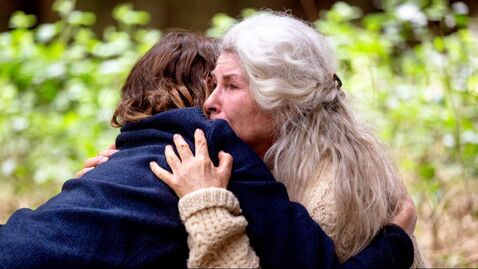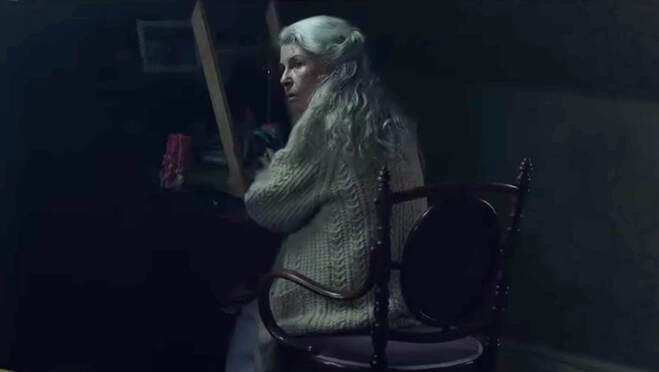 There is nothing more frightening than losing a family member to mental illness that deteriorates into death... ...Unless, of course, you are the family member getting lost in the labyrinth of the illness, grasping desperately at the pieces of yourself you know were once true and vital. Where once you had a memory—a name, a place, a basic task no one ever thinks of—suddenly there’s nothing but a gaping empty space. People tell you you’re forgetting things, you should be somewhere where you can be watched and safely cared for, but you don’t even remember forgetting in the first place. Losing yourself despite all your best efforts to stop it is terrifying. Looking around your home and seeing nothing but unfamiliar terrain you’ve forgotten how to properly navigate is earth-shattering. But it’s not just what you can’t remember that leads to the loss. Sometimes it’s people, places, things, you didn’t even know you remembered, rushing back in vivid detail right before your eyes—and no one else’s. People look at you with pity and, maybe, a touch of unease when all you’re trying to do is live your life. I lost my great grandfather right before I went off to college. I’ve never written about it before. I wasn’t sure I had the words. It completely shattered my world in an irrevocable way. I keep him with me, feel him with me always, but that loss was the first major loss I’d ever personally experienced. He was ridiculous, and funny, and sang to us, and danced center-stage with my grandma at every anniversary party. And as he got older, he developed dementia. I can remember watching him sitting in his favorite chair talking to some little boy none of the rest of us could see while we sat together in the living room. Seeing cars across the street that weren’t there for the rest of us to see. Lashing out at family members that tried to help him with basic self-care tasks he’d been able to do on his own not that long ago. I had never really seen anything that depicted what it was like to watch and hear about that happening. The casual, gradual thievery of a bedrock person in your life until they’re almost—but not quite—unrecognizable. The grasping, trying to remind them and bring them back to the present. It’s scary, watching someone you love struggle to remember where they are or who’s around in the middle of the afternoon. There’s nothing to do but watch it happen. Natalie Erika James’ Relic takes that idea of the erosion of family across generations and puts it on full, unflinching display. It’s slow, insidious, and right in your face. The mold swallowing your loved one whole is an unstoppable progression of sickness. Part of Edna’s (Robyn Nevin) methods for holding onto her mind is leaving notes for herself all around the house. Sometimes they’re simple tasks like “turn off tap”, other times they’re way more gut-wrenching, necessary reminders like “I am loved.” The more surface level notes are early on and in plain view. The more significant ones—ones we wouldn’t ever think to second guess—are buried deep. No one wants to reveal how adrift they really are. In particular, though, adults who become so used to being either independent or caregivers for other people will fight tooth and nail to maintain their livelihoods as they know them no matter how deeply they have to bury something. But nothing debilitating stays buried forever, and people need people, always. Family, for better or worse, needs family. Talking about Relic without feeling my eyes well up is hard. I couldn’t put my finger on why when I first watched it. Sure, it was hard to watch. Sure, I cried as I watched it. So, what? The list of media I cry watching is virtually bottomless. The list of things I can hardly talk about without tearing up is far smaller, however. But I figured it out, I think. Relic and movies that tell stories like it force us to confront some of the worst scenarios imaginable and consider how we might deal with them. There aren’t words for how hard it is to face something so vastly ruinous as loss of family and autonomy to that degree. I have a disability that can wreak havoc on my body, but I get to keep my mind. Dementia and its related conditions are less forgiving, and in extreme later stages can involve bodily harm in addition to the mental obliteration. You can look at someone you’ve known your whole life, someone you might even have held as a baby, and have no clue who they are anymore. Maybe the itch of familiarity is there, buried somewhere in the shadows, I’m not sure. I’ve never been able to tell for certain. I like to think so, though. I like to imagine that even in the darkest moments of our minds and our hearts we can hold on to the people that bring us light and face the unknowable together. I’d have faced the unknowable alongside my grandpa as long as I could have, even as the bitter thorn of loss took him. I still have him, after all. In my heart and in little places all over my house. Relics of my own, to remember the good times. The songs. The laughter. The love of a piece of family that takes me for whatever I am. I like to think he’s proud of me now, for doing what I love, and for finally starting to have the words. 'Relic' is now out on VOD from IFC Midnight By Katelyn Nelson Enjoy Katelyn's writing? Leave her a tip here through Ko-fi!
0 Comments
Leave a Reply. |
Archives
March 2023
|

 RSS Feed
RSS Feed